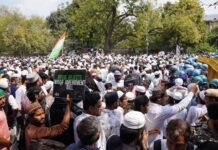The World Cup will start in Brazil today and will last for around a month. There are three teams from Muslim majority countries taking part, as well as a few teams like Ivory Coast, Nigeria and Cameroon who have several Muslim players.
5pillarz will be following the progress of the Muslim teams and players at Brazil 2014 and we’ll kick off our coverage with a profile of the three Muslim teams that are taking part.
Bosnia-Hercegovina
Despite being the only World Cup debutants, Bosnia are favourites to reach the last 16 thanks to their attacking firepower and technical ability. Their cavalier tactics in qualifying – a 4-4-2 diamond – yielded 30 goals, 18 from strike duo Edin Dzeko and Vedad Ibisevic.
While the squad is overflowing with playmakers, it lacks effective ball-winners to screen the defence. Expect them to change formation against Argentina but go for the jugular against Nigeria and Iran.
Manchester City’s Edin Dzeko, 33 goals in 60 internationals, is an obvious figurehead, but the playmaker Miralem Pjanic is key. Full of flair and energy, the 24-year-old scored what his Roma coach Rudi García called a “Maradona-esque” goal against Milan in April.
Subscribe to our newsletter and stay updated on the latest news and updates from around the Muslim world!
The coach, Safet Susic, says his “tactical gamble” – playing all his star forwards at once in a flexible 4-1-3-2 – is for the good of the game.
Iran
This is Iran’s fourth World Cup finals and they are yet to compete in the knockout stages. They will hope the attacking threat of Fulham midfielder Ashkan Dejagah and veteran captain Javad Nekounam gets them out of the groups this time.
A predominantly domestic-based squad will do well to improve on Iran’s World Cup record of one win in nine attempts. They only conceded twice in eight matches during the final qualifying phase but stronger opponents lie ahead.
Their star man is Reza Ghoochannejhad who could solve the country’s goalscoring woes. Technically deft and endowed with a terrific shot he represented Holland at youth level, his parents having moved to the Netherlands when he was a child.
Coach Carlos Queiroz has complained repeatedly about his team’s disorganised preparation for the finals, bemoaning the lack of friendlies, non-cooperation of domestic clubs and even the quality of the new kit. So no surprise the former Manchester United assistant manager’s contract will not be renewed after the finals. Iran can no longer afford his salary of around £2m per year.
Team Melli generally take a cautious approach under Queiroz, partially in recognition of a lack of firepower.
Algeria
Write off Algeria at your peril. No longer World Cup whipping boys, the Desert Foxes are boosted by a stronger professional league, improving standards at grassroots level and an influx of players with Algerian parents or ancestry.
World Cup stars of yesteryear Diego Maradona and Rivaldo, as well as Javier Zanetti, have been queuing up to sing the virtues of the Greens’ class of 2014 – the only Arab nation present in Brazil. Maradona predicts Algeria “will cause a surprise”, while Rivaldo says “the possibilities of reaching the second round are abundant”.
Sofiane Feghouli, a former France youth international whose speed makes him a natural winger, is the star man and has usually been deployed centrally by Algeria since pledging his international allegiance to the country in 2011.
Critics insist he should score more often but his many admirers point to the number of chances that he creates for team-mates thanks to an immaculate first touch, excellent passing and knack for producing the unpredictable. Manage to stifle him and opponents will have gone a long way to neutralising Algeria.
The coach Vahid Halilhodzic goes to his first World Cup after being sacked by Ivory Coast three months before the last one. During a nine-club, two-country career his confrontational style has led to numerous fallouts including, while in charge of Paris Saint-Germain, a two-month ban for being mean to a referee.
For Algeria’s fourth finals they have set themselves the target of progressing beyond the group stages for the first time. They are not as talented as the team who nearly achieved that feat in 1982 but at least this time they will not be thwarted by dastardly collusion between West Germany and Austria.
Halilhodzic is partial to a 4-1-4-1 formation, even more so since the France-born Nabil Bentaleb declared for Algeria, with the Tottenham Hotspur player immediately entrusted with providing midfield protection for a brittle defence marshalled by the creaking Bougherra. Two rapid wingers and the more central Feghouli are the men most likely to create chances for Slimani.

























